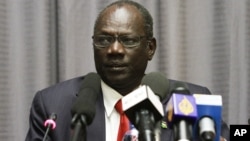South Sudanese Information Minister Michael Makuei on Tuesday dismissed a proposal that President Salva Kiir should share power with rebel leader Riek Machar in a transitional government.
“It was just a proposal and that proposal has been rejected. So it is a non-starter," Makuei told reporters in Juba.
Makuei said mediators from the Intergovernmental Authority on Development (IGAD) surprised the government negotiating team when they presented the power-sharing proposal at last week's summit meeting of regional leaders in Addis Ababa.
Makuei said IGAD heads of state and government who were at the summit rejected the power-sharing proposal, which goes against what was agreed to at a high-level meeting in August. At that meeting, regional leaders proposed that the president would be head of state and government, and the newly created post of prime minister would hold no executive powers, Makuei said.
If the power-sharing proposal were to be taken up, it would turn South Sudan into a “testing ground” for new principles of governance, Makuei said.
Outside intervention
Makuei also rejected a clause in the communique released by IGAD at the end of last week's summit, in which the regional bloc says that if either of the two warring parties violates the ceasefire, IGAD member states would intervene in South Sudan without first consulting with the government in Juba.
Makuei insisted that the clause was amended after the two sides signed the document, and warned that outside intervention in South Sudan could cause the conflict to spread beyond the country's borders and enflame the entire region.
But, he said, in spite of all of its reservations, the government is prepared to make concessions and reach a final agreement to end 11 months of conflict that has killed at least 10,000 people and displaced nearly two million.
Among those concessions, he says, are that former government workers, including members of parliament, would be allowed to return to their old jobs and soldiers and military officers who defected from the SPLA would be re-integrated into the armed forces.
IGAD leaders have given the warring sides in South Sudan two weeks to hammer out the details of the transitional government. They have threatened the government and rebels with stern action, including targeted sanctions and an arms embargo, if they fail to reach an agreement or violate the ceasefire.




